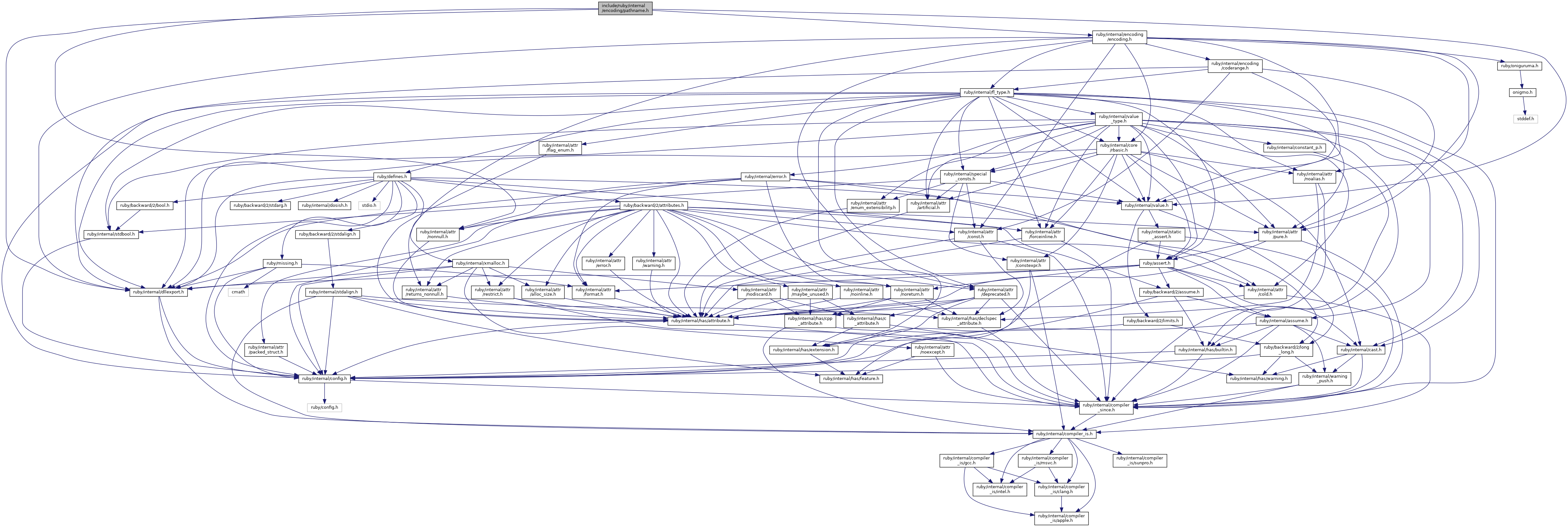(7d5c0247eb2fb67bb0ac2fd6060bf2996c8c4c46)
Routines to manipulate encodings of pathnames. More...
#include "ruby/internal/attr/nonnull.h"#include "ruby/internal/dllexport.h"#include "ruby/internal/encoding/encoding.h"#include "ruby/internal/value.h"

Go to the source code of this file.
Functions | |
| char * | rb_enc_path_next (const char *path, const char *end, rb_encoding *enc) |
| Returns a path component directly adjacent to the passed pointer. | |
| char * | rb_enc_path_skip_prefix (const char *path, const char *end, rb_encoding *enc) |
| Seeks for non-prefix part of a pathname. | |
| char * | rb_enc_path_last_separator (const char *path, const char *end, rb_encoding *enc) |
| Returns the last path component. | |
| char * | rb_enc_path_end (const char *path, const char *end, rb_encoding *enc) |
| This just returns the passed end basically. | |
| const char * | ruby_enc_find_basename (const char *name, long *baselen, long *alllen, rb_encoding *enc) |
Our own encoding-aware version of basename(3). | |
| const char * | ruby_enc_find_extname (const char *name, long *len, rb_encoding *enc) |
Our own encoding-aware version of extname. | |
Detailed Description
Routines to manipulate encodings of pathnames.
- Copyright
- This file is a part of the programming language Ruby. Permission is hereby granted, to either redistribute and/or modify this file, provided that the conditions mentioned in the file COPYING are met. Consult the file for details.
- Warning
- Symbols prefixed with either
RBIMPLorrbimplare implementation details. Don't take them as canon. They could rapidly appear then vanish. The name (path) of this header file is also an implementation detail. Do not expect it to persist at the place it is now. Developers are free to move it anywhere anytime at will.
- Note
- To ruby-core: remember that this header can be possibly recursively included from extension libraries written in C++. Do not expect for instance
__VA_ARGS__is always available. We assume C99 for ruby itself but we don't assume languages of extension libraries. They could be written in C++98.
Definition in file pathname.h.
Function Documentation
◆ rb_enc_path_end()
| char * rb_enc_path_end | ( | const char * | path, |
| const char * | end, | ||
| rb_encoding * | enc | ||
| ) |
This just returns the passed end basically.
It makes difference in case the passed string ends with tons of path separators like the following:
- Parameters
-
[in] path Where to start scanning. [in] end End of the path string. [in] enc Encoding of the string.
- Returns
- A pointer in the passed string where the trailing path separators start, or
endif there is no trailing path separators.
◆ rb_enc_path_last_separator()
| char * rb_enc_path_last_separator | ( | const char * | path, |
| const char * | end, | ||
| rb_encoding * | enc | ||
| ) |
Returns the last path component.
- Parameters
-
[in] path Where to start scanning. [in] end End of the path string. [in] enc Encoding of the string.
- Returns
- A pointer in the passed string where the last path component resides, or
endif there is no more path component.
◆ rb_enc_path_next()
| char * rb_enc_path_next | ( | const char * | path, |
| const char * | end, | ||
| rb_encoding * | enc | ||
| ) |
Returns a path component directly adjacent to the passed pointer.
- Parameters
-
[in] path Where to start scanning. [in] end End of the path string. [in] enc Encoding of the string.
- Returns
- A pointer in the passed string where the next path component resides, or
endif there is no next path component.
◆ rb_enc_path_skip_prefix()
| char * rb_enc_path_skip_prefix | ( | const char * | path, |
| const char * | end, | ||
| rb_encoding * | enc | ||
| ) |
Seeks for non-prefix part of a pathname.
This can be a no-op when the OS has no such concept like a path prefix. But there are OSes where path prefixes do exist.
- Parameters
-
[in] path Where to start scanning. [in] end End of the path string. [in] enc Encoding of the string.
- Returns
- A pointer in the passed string where non-prefix part starts, or
pathif the OS does not have path prefix.
◆ ruby_enc_find_basename()
| const char * ruby_enc_find_basename | ( | const char * | name, |
| long * | baselen, | ||
| long * | alllen, | ||
| rb_encoding * | enc | ||
| ) |
Our own encoding-aware version of basename(3).
Normally, this function returns the last path component of the given name. However in case the passed name ends with a path separator, it returns the name of the directory, not the last (empty) component. Also if the passed name is a root directory, it returns that root directory. Note however that Windows filesystem have drive letters, which this function does not return.
- Parameters
-
[in] name Target path. [out] baselen Return buffer. [in,out] alllen Number of bytes of name.[enc] enc Encoding of name.
- Returns
- The rightmost component of
name.
- Postcondition
baselen, if passed, is updated to be the number of bytes of the returned basename.-
alllen, if passed, is updated to be the number of bytes of strings not considered as the basename.
◆ ruby_enc_find_extname()
| const char * ruby_enc_find_extname | ( | const char * | name, |
| long * | len, | ||
| rb_encoding * | enc | ||
| ) |
Our own encoding-aware version of extname.
This function first applies rb_enc_path_last_separator() to the passed name and only concerns its return value (ignores any parent directories). This function returns complicated results:
- Parameters
-
[in] name Target path. [in,out] len Number of bytes of name.[in] enc Encoding of name.
- Returns
- See above.
- Postcondition
len, if passed, is updated (see above).